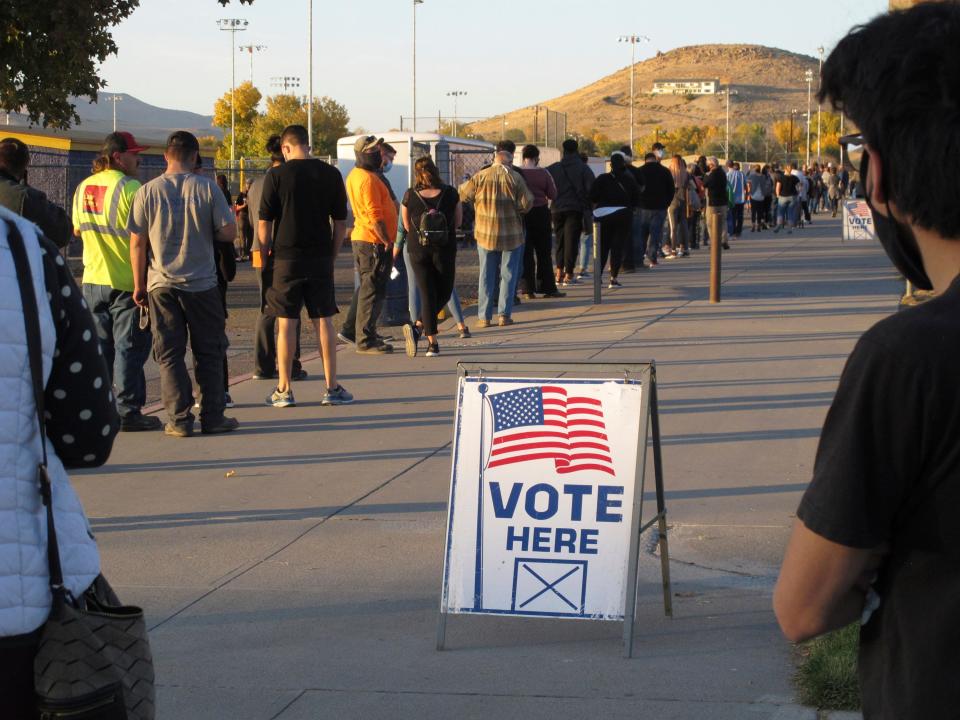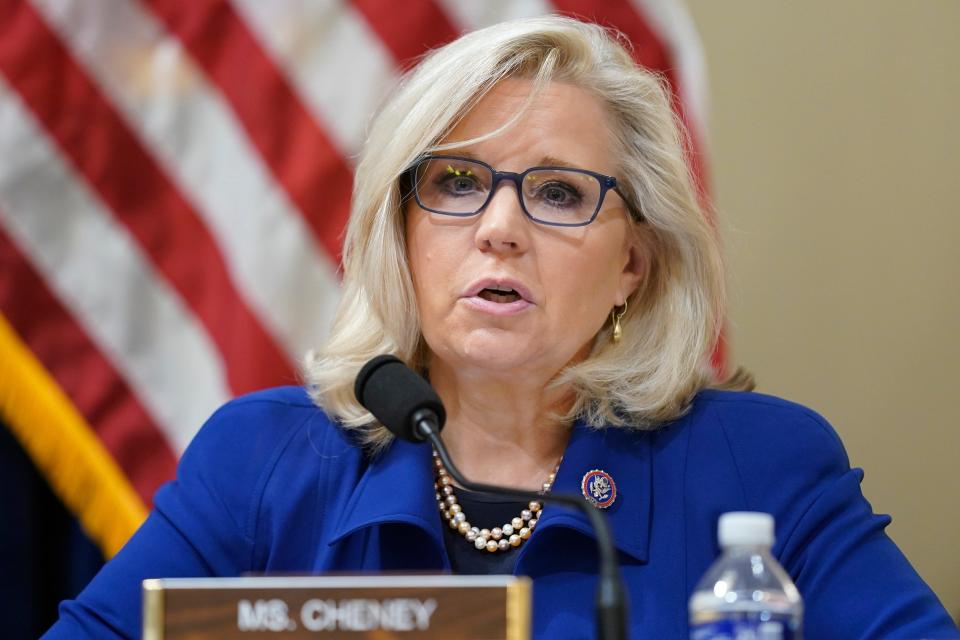A QAnon conspiracy theory about election fraud is becoming a pro-Trump push for traceable ballots
- Oops!Something went wrong.Please try again later.
Pro-Trump contenders who maintain the 2020 presidential contest was "rigged" against the former president are shifting their focus to new election and ballot security measures anchored by online conspiracy theories.
One of the right's emerging favorites is traceable ballots, a combination of printed security paper and digital tracking that would allow a person to look up their ballots after being cast.
An "America First" coalition of secretaries of state candidates backed by former President Donald Trump are among those calling for election officials to adopt those traceable, watermarked ballots as a remedy to fraudulent or illegal voting – even in the absence of proof of widespread voter fraud.
The idea is especially attractive to right-leaning candidates who say it will secure U.S. elections and restore faith in the process as turnout woes plague Republicans, some of whom argue their base is being depressed by the false claims.
But critics warn traceable ballots have their recent roots in online conspiracy theories around an election where the current protections largely worked. Others, including election security advocates who are more sympathetic to the idea, fear it would also violate a person's right to cast a secret ballot, a mainstay of the U.S. democratic system for the last hundred years.
"There is this lie that's still being peddled by many of the supporters of the former president, that the election was stolen, and that's impacting the views of Republicans and conservatives," Trey Grayson, a Republican and former Kentucky secretary of state, told USA TODAY. "And there are people and there are groups that are trying to exploit this."

A PIN for your ballot
Most states allow voters to track their mail-in or absentee ballot similar to a package delivery. That was one thing Democratic and Republican election officials touted to help build confidence in mail-in ballots as COVID-19 forced voting procedural changes last year.
But what deeply conservative candidates aligned with Trump want is different. They are calling for a system that allows individuals to ferret out their individual ballot after it is scanned to verify it was counted correctly.
Rachel Hamm, a conservative candidate for California secretary of state, said she envisions assigning voters a PIN number where they can confirm their ballot was tabulated. She said voters should be able to use that identification to look up how they voted.
Jason Snead, executive director of the Honest Elections Project, a group founded by former Trump adviser Leonard Leo, said his group has also been interested in the idea of individual voters being able to trace their own ballot.
"I certainly understand the impulse of this sort of policy reform," he said, comparing people who wants traceable ballots to people who check up on their Amazon packages. "People want certainty, and they're accustomed to that in the 21st century with so many other things."
One of the chief concerns, he said, would be if such a tool would undercut the secrecy of a person's ballot if a fraud case were brought to court.
But Snead said the idea of voters being able to see their scanned ballot is still worth looking into with appropriate safeguards given the lingering doubts among a subset of voters about last year's election.
"In general, what you want to do is is remove the clay in the joints that basically leads to a sense of uncertainty," Snead said. "There are certainly reforms that can remove some of that uncertainty."
No evidence of systemic fraud
Critics of the idea, however, worry that diving into this debate further hurtles the GOP base into a land of conspiracy theories without any basis in reality.
Grayson, who served on former President Barack Obama's bipartisan commission on election administration in 2012, said calls to institute traceable or watermarked ballots neglect security measures that are already in place at the local, state and federal levels.
He also noted how election officials last year oversaw one of the safest contests in history.

The MITRE Corporation, for instance, a nonprofit research group for several U.S. agencies, conducted one of the most comprehensive studies of eight battleground states during the 2020 election.
Its 43-page analysis looked at several claims pushed by conspiracy theories about voting machines, vote harvesting and "ballot dumping." The report, released in February, found "no evidence of fraud, manipulation, or uncorrected error" in those states.
There has been no evidence of systemic fraud in any state, Grayson said, nor did state or federal agencies find any instances of foreign actors meddling with election infrastructure, such as voting machines.
"This proposal that is being pushed out by this kind of coalition of Trump endorsed candidates, who also endorsed the lie, I have a hard time accepting with good faith," he said. "Those of us in the election space, we need to do a better job of talking about some of the things that are already being done."
QAnon conspiracy theory origins
Once voting concluded in the 2020 election, some of Trump’s most fervent supporters took to the internet falsely claiming he had secretly stamped mail-in ballots before the election to catch cheating Democrats.
QAnon conspiracy theories also alleged federal agencies had pre-marked ballots with a “non-radioactive isotope" or watermark, as a way to distinguish them from false ballots.
Both claims were quickly debunked by fact-checkers and government officials.
Chris Krebs, the former director of the U.S. government's Cybersecurity and Infrastructure Security Agency, tweeted last year that no federal agencies had designed ballots.
“Don't fall for these efforts to confuse (and) undermine confidence in the election,” Krebs said in a Nov. 6 tweet.
But that hasn’t stopped some Trump allies from fastening onto the concept.
In Arizona, state Rep. Mark Finchem has been one of the more outspoken proponents of using anti-counterfeiting techniques as a way to track ballots and audit elections.
"Treat ballots like currency, (give) them the same security measures and counterfeit protections we have for our own money," Finchem, who is running for secretary of state in Arizona, said in an Oct. 11 tweet.
Treat ballots like currency, giving them the same security measures and counterfeit protections we have for our own money.
— Mark Finchem (@RealMarkFinchem) October 11, 2021
Security measures already in place
U.S. elections currently have several security and detection measures in place aimed at making counterfeit ballots difficult, according to federal officials. Ballots are created by local governments, and each state has a separate ballot design printed through an extensive process.
The CISA says specifics vary depending on state and local laws but that multiple jurisdictions require barcodes, watermarks and precise paper weights.
"Committing fraud through photocopied or home-printed ballots would be highly difficult to do successfully," the CISA website says.
Some states, such as California, have watermark designs and QR codes to ensure mail-in ballots reach the correct voters.
Election watchdog groups say the current security measures haven't failed voters and that election officials should be wary of those pushing for tighter controls based on false claims about 2020.
"We should not be making election policy based on conspiracy theories," said Sarah Walker, executive director of Secure Democracy, a nonprofit group that works to improve election integrity.

Charlie Booner, a spokesman for Move Texas, a voting rights advocacy group, said the potential of making people's private voting data public would be a red flag.
"The privacy and the secrecy of the ballot is critical," he said. "This is not something that is coming from elections experts or cybersecurity experts, who frankly are the people that we need to be turning towards in this moment."
Touring a potential ballot maker
Hamm was among a handful of Republican secretary of state candidates, many backed by Trump, who flocked to Authentix, a Dallas-based anti-counterfeiting company, on Oct. 6 for a tour.
Those in attendance, Hamm said, were provided with multiple examples of traceable ballots that could be used in future elections.
"The layers of protection that they have in the product is mind blowing," Hamm said. "It is very sophisticated."
Authentix spokesman Kent Mansfield told USA TODAY the company, which has offices across the globe, has decades of experience creating and supplying highly secure and traceable documents and tamper proof seals.
Mansfield did not say how much it would cost to implement in certain states or nationally but said Authentix prints billions of unique security documents that can include covert and overt security features, including digital authentication and traceability.
"Our clients range from Fortune 100 companies, national governments and various government agencies and central banks in the United States and around the globe," he said.
Get out the (traceable) vote?
But traceable ballots are more than an election security proposal among far-right activists or conservative contenders backed by Trump.
They're also a get out the vote tactic to combat reports of depressed turnout among the GOP base, which political observers say is a result of the false clams that many of the same candidates peddle.
Trump underscored this friction within the party when he warned last week that if Republicans don't do more to vindicate his false election assertions the base won't come out for next year's midterms or the 2024 presidential election.
"All of us, as candidates, are hearing over and over 'why would we ever give money to a campaign again when elections are rigged.' We're facing this same problem," Hamm told USA TODAY. "What do we do when a large percentage of the public really wholeheartedly believe our elections are not honest?"
Republican consultants, strategists and officials across the country have openly fretted that Trump and his allies' continual insistence on pointing to voter fraud is a losing campaign strategy that only depresses the conservative base.
Many continue to blame the former president's rhetoric about the 2020 election for hurting two Georgia Republican incumbents, Sens. Kelly Loeffler and David Perdue, during their failed run-off races in January.
"The person that they most admired in their conservative beliefs was telling them that their vote didn’t count," Georgia Lt. Gov. Geoff Duncan, a Republican, told the New York Times in September. "And then the next day he would tell him that the election was rigged, and then the next day he would tell them, ‘Why even show up?’ And they didn’t. And that alone was enough to swing the election to the Democrat side."
Similar concerns were aired by GOP consultants over party leaders promoting unsubstantiated claims of fraud ahead of the failed recall against Democratic California Gov. Gavin Newsom.

Republican Rep. Liz Cheney, of Wyoming, an outspoken Trump critic, beseeched her GOP colleagues on Tuesday to admit election fraud is not to blame for the party's election woes.
"You all know that there is no evidence of widespread election fraud sufficient to overturn the election," Cheney said during a meeting of the House Select Committee investigating the Jan. 6 Capitol attack.
"You know these claims are false," she added. "Yet former President Trump repeats them almost daily. He has now urged Republicans not to vote in the 2022 and 2024. This is a prescription for national self-destruction."
But Republican candidates seem unwilling to relinquish Trump's false narrative even as they try to keep their voters engaged in the electoral process for the 2022 midterms.
Republican Michigan gubernatorial candidate Garrett Soldano went out of his way to tell supporters at a rally in September, "your vote is going to count."
"They are not going to get away with what they got away with this past election in the future," Soldano said.
This article originally appeared on USA TODAY: QAnon election fraud conspiracy theory may influence future of voting

